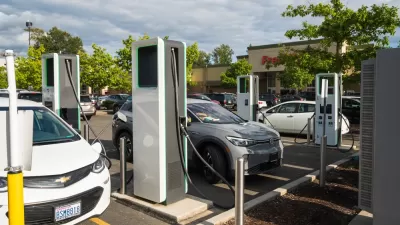Local zoning codes can be adjusted to encourage the building of EV charging infrastructure into neighborhoods.

In an article for the New York Law Review, Anthony S. Guardino outlines the zoning and regulatory challenges faced by municipalities hoping to shift to electrified vehicle infrastructure.
“In order to facilitate and encourage more EV charging stations, municipalities need to update their zoning ordinances to regulate and manage this new land use. Zoning code amendments should provide developers and property owners with clear guidance on the manner in which applications for charging stations will be processed and the timing of approvals, so that the process is more predictable.”
The article suggests that cities can include EV charging requirements in building codes, pass ordinances that facilitate charging facilities in neighborhoods, and streamline approval processes for EV charging stations. “Some New York municipalities have updated their zoning ordinances to address the above questions by designating EV charging stations to be permitted principal uses in commercial and industrial districts, or by allowing EV charging to be located in all zoning districts as permitted accessory uses.”
The article concludes that, as EV adoption grows, cities should proactively update their zoning codes to account for electric vehicle infrastructure.
FULL STORY: Thorny Zoning Questions Posed by EV Charging Stations

Planetizen Federal Action Tracker
A weekly monitor of how Trump’s orders and actions are impacting planners and planning in America.

Congressman Proposes Bill to Rename DC Metro “Trump Train”
The Make Autorail Great Again Act would withhold federal funding to the system until the Washington Metropolitan Area Transit Authority (WMATA), rebrands as the Washington Metropolitan Authority for Greater Access (WMAGA).

The Simple Legislative Tool Transforming Vacant Downtowns
In California, Michigan and Georgia, an easy win is bringing dollars — and delight — back to city centers.

The States Losing Rural Delivery Rooms at an Alarming Pace
In some states, as few as 9% of rural hospitals still deliver babies. As a result, rising pre-term births, no adequate pre-term care and "harrowing" close calls are a growing reality.

The Small South Asian Republic Going all in on EVs
Thanks to one simple policy change less than five years ago, 65% of new cars in this Himalayan country are now electric.

DC Backpedals on Bike Lane Protection, Swaps Barriers for Paint
Citing aesthetic concerns, the city is removing the concrete barriers and flexposts that once separated Arizona Avenue cyclists from motor vehicles.
Urban Design for Planners 1: Software Tools
This six-course series explores essential urban design concepts using open source software and equips planners with the tools they need to participate fully in the urban design process.
Planning for Universal Design
Learn the tools for implementing Universal Design in planning regulations.
Smith Gee Studio
City of Charlotte
City of Camden Redevelopment Agency
City of Astoria
Transportation Research & Education Center (TREC) at Portland State University
US High Speed Rail Association
City of Camden Redevelopment Agency
Municipality of Princeton (NJ)





























